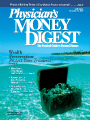Publication
Article
Physician's Money Digest
JAMA as a Stock Tout?
Author(s):
Journal of theAmerican Medical Association
JAMA
JAMA
JAMA
When the respected (;jama.ama-assn.org) publishes the resultsof clinical trials of pharmaceuticals, ittypically places an embargo on tradejournalists that forbids them to disclosethe clinical data until the magazine is officially published. But some critics in thefinancial industry point out that isactually printed and shipped several daysbefore the official publication date, oftengiving physician-subscribers advance informationthat they can use to theiradvantage in the stock market. And if adoctor puts their issue of in theoffice waiting room, patients can alsoread about clinical trials and act on thatinformation before the rest of the publicknows about it.
JAMA
In a recent case reported by ReutersHealth (www.reutershealth.com), published data from clinical trials ofEsperion's ETC-216, which showed that,while the drug was very effective in clearingarteries, it did not perform as well asthe drug maker had hoped it would.Though many expected plaque reductionsof around 10%, it reduced arterialplaque by just 4.2%. The trial alsorevealed a high incidence of gastrointestinalside effects in patients on high dosagesof the drug. Although the results of thetrial weren't officially available to thegeneral public until after Tuesday's market close, Esperion's stock dropped 26%during the previous trading day.
JAMA
officials strongly deny thatthe early distribution of the magazineconstituted a leak of advance informationon Esperion. Some Wall Street analysts,however, maintain that putting anembargo on public disclosure whileshipping copies of the magazine 5 daysbefore the embargo is due to expiregives some investors the equivalent ofinsider information. Trading on insiderinformation is unethical, and, as Dr.Sam Waksal of ImClone found out, caneven be a criminal offense.
